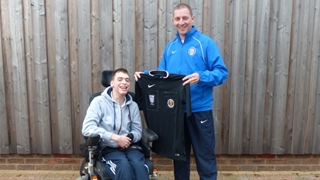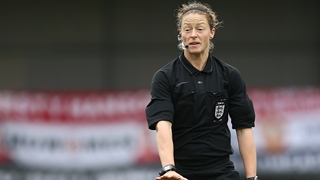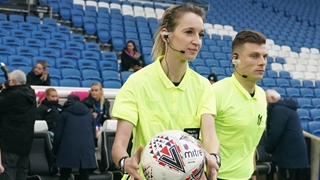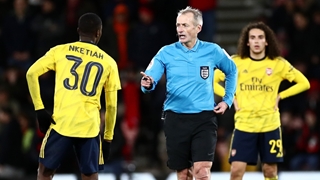
In the latest of our 'On the Spot' series, we spoke to FA CORE Midlands centre leader Rob Shoebridge to find out about trading life as a top referee for a coaching role.
The now 44-year-old was a Level 1 official until a serious Achilles injury cut his career short back in 2014.
But he didn't allow that to bring the curtain down on his involvement in the game and very quickly became embroiled in the art of referee coaching before accepting a position with the FA Centre of Refereeing Excellence in 2016.
Shoebridge was the first man from Derby to become a Level 1 referee for more than 40 years and since taking up his coaching role, he's already played a pivotal role in the development of the next generation of officials.
How have you found swapping refereeing for coaching?
In all honesty, you don't get the same sort of buzz and adrenaline out of what you get stepping onto the pitch to take charge of a game at somewhere like St James' Park.
But you do get a fantastic sense of achievement when you see the guys you've worked with getting allocated top games themselves and the rewards come from seeing the fruits of your labour really.
I suffered a serious Achilles injury in 2014 which forced me to retire and I began to start coaching at a local level before moving on to work for the FA CORE programme in the Midlands a coupe of years later.
Now I've seen the first referee I ever worked with, James Oldham, become the youngest Level 1 referee in the country this season.
That was incredibly rewarding because when I was younger we didn't have this sort of guidance that the referees have now - we had to learn from our own mistakes.
How did you first get into refereeing?
I was never very good at playing football but I really liked being involved so I thought I'd try refereeing. My school was always after a referee because nobody else wanted to do it so it was always there as an option for me.
Where and when did you take your course?
I was 14 years old at the time I took my course in Derby. I moved on to the local leagues as well as the school games so from there it started to become a weekend hobby for me as well.
What do you remember of the first game you ever took charge of?
I will always remember that because there was quite a nasty injury in the game - a high-foot challenge led to one of the boys' faces being slit open. It was one of those where it was a 50-50 but there was a lot of blood and the player was only around 11 years old so the emotions of the parents and spectators were running high. They felt as though something should've happened to the other player but it was a fair challenge in my eyes.
What about something you've carried with you throughout your career?
I was around 17 at the time and I got a call on Sunday evening asking if I could take a Tuesday evening game between two teams which I knew there was bad blood between. I ended up sending four players off in that game and chased back to my car afterwards which wasn't very pleasant. When I got home I was completely demoralised and chucked my bag in the corner of the room and I could've left it there but I didn't. Three years of hard work would've gone to waste and so I decided that I would dust myself down and carry on.
What would you say to anyone that is considering become a referee coach?
Coaching shouldn't be seen as being put out to pasture in any way because it opens lots of new doors. Yes, it's the end of a chapter in a sense because you're not out there refereeing but I have experienced many new things that I never would've done as referee. I've been to Denmark and India in the last year alone which is something I never would've done if I hadn't started this new chapter of my career.
Give us one top tip you try to pass on to your students?
You still need to be open-minded, being inquisitive but also not being afraid to make mistakes because those mistakes will make you a better referee.









